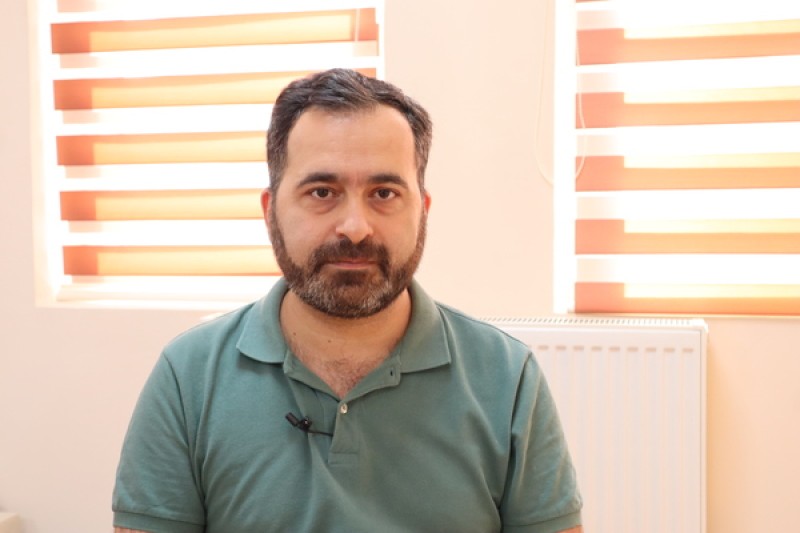The channel, called ‘The Exposure of Bakhtiyar’ in Azerbaijani, has been leaking private messages with intimate photos from Hajiyev’s Facebook account involving several other activists and journalists. It is unclear who is behind the channel, but in Azerbaijan in recent years there has been an epidemic of leaks of private, personal content, often targeting opposition activists like Hajiyev.
With his health reportedly deteriorating, Hajiyev has now been on a hunger strike for 50 days to protest the criminal charges against him, which he alleges to be politically motivated.
“The people behind the circulation of the doctored private life of Bakhtiyar Hajiyev have actually proven once again that Hajiyev’s arrest and punishment are political,” Agil Layij, one of his lawyers, posted on Facebook.
Hajiyev was arrested on December 9, 2022 on charges of hooliganism and contempt of court.
The charges against him arose from an incident at a court hearing in October 2021 regarding a dispute between Hajiyev and his neighbor, journalist and TV personality Ulviyya Alovlu. Alovlu claims that she and Hajiyev agreed to have their cats mate and then split the litter, but that he never gave her a kitten that she was owed. A leaked video of the hearing shows Hajiyev throw some papers at the table where Alovlu was sitting.
Hajiyev was eventually arrested over a year after the said incident occurred and sentenced to pre-trial detention for one month and 20 days, extended on January 21 for another month.
Many commentators, including even Hillary Clinton, have claimed that the charges against Hajiyev are politically motivated. Hajiyev himself suggested that they are connected to recent U.S. sanctions which were announced only hours before his detention, including against colonel Karim Alimardanov, an Azerbaijani police officer accused of torture. The belief is that Hajiyev helped the colonel get on the list.
In December, a few days later, a private chat from 2019 between Hajiyev and a journalist from a pro-government media outlet was leaked. Then on Friday the Telegram channel ‘The Exposure of Bakhtiyar’ was created in a serious escalation of the invasion of Hajiyev’s privacy. The channel, which currently has nearly 4,000 followers, has been publishing intimate conversations and photos between Hajiyev and several women, primarily journalists from independent media outlets and opposition activists themselves.
In recent years, in Azerbaijan there have been numerous instances of private photos, videos, and conversations leaked to the public, often targeting opposition activists and independent journalists, especially women. Many observers have suggested that the authorities use this as a tactic to control civil society.
“The fear of becoming a victim of such a scheme ensures that millions get the message to stay quiet when they want to speak up, or else,” wrote Narmin Shahmarzade, one of the victims of an earlier leak, in 2021.
On December 15, Hajiyev launched a hunger strike in protest against his detention, but ended it two weeks later at the request of his family. He resumed the strike on January 9, however, and has continued it to the present for 50 days and counting. On February 16, Hajiyev announced that he would no longer drink water. At the insistence of his family and legal team, he agreed to accept some nutrients through an IV, but his health is reportedly in critical condition.
“Azerbaijani democracy activist Bakhtiyar Hajiyev has been detained since December on charges that are widely known to be politically motivated,” wrote Samantha Power, administrator of the U.S. Agency for International Development (USAID). “Hajiyev is on a hunger strike and his health is rapidly deteriorating. He must be released.”



